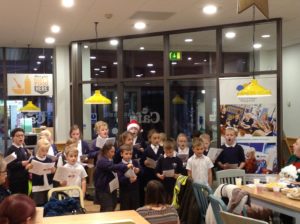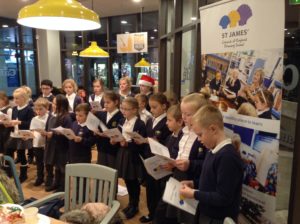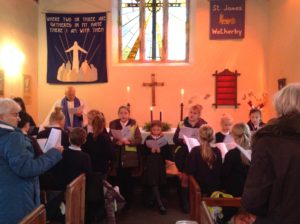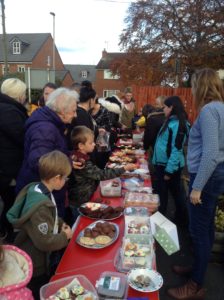Singing in the community
Posted on 05 December 2017 by Miss Beatson
The choir have been very busy today, singing at The Church on the Corner this morning and Morrisons after school. They will be singing at Moto services on Friday, Ashfield Nursing Home next Tuesday and Morrisons again next Wednesday! Hopefully, they’ll still have a voice left for our Christmas production!



New Football Kit
Posted on 05 December 2017 by Miss Beatson
Thank you to Suttle Transport Services for sponsoring our new football kit. The children were very excited to try it on for the first time yesterday. We look forward to competing in our new kit next term. 
School Charity
Posted on 04 December 2017 by Miss Beatson
After much discussion, the school council have decided that we will support the charity Unicef this year. The children were keen to support a charity which helps children around the world.

Christmas Fair
Posted on 01 December 2017 by Miss Beatson
Our Christmas Fair is this afternoon. Please come along and get into the festive spirit. We have lots of stalls to visit and the school choir will be singing at 3.30pm.
‘Pick a square’ could win you this delicious Christmas cake.

Subscribe to First News and raise money for school
Posted on 29 November 2017 by Mrs Quirk
Sphere Federation has teamed up with First News to offer a fantastic opportunity which will help us raise money for our school.
The children love reading First News in school and now you have the chance to get a great offer and have First News delivered to your house every Friday for your kids to enjoy at home.
To make things even better for every subscription parents take out using our unique voucher codes X17SFED we will get money back to put towards our school.
To subscribe, please click here.
Important information regarding measles
Posted on 21 November 2017 by Mrs Quirk
You may have heard in the news that there have been a number of confirmed cases of measles in Leeds. As you will be aware, measles is extremely infectious and can be a serious illness in some cases. The attached information contains advice on preventing the spread of measles, what the symptoms of measles are and how parents can protect their families by ensuring that their children have had two doses of the MMR vaccine.
If you are not sure whether your child is up to date with their vaccinations or your child is not up to date, please make an arrangement with your GP practice as soon as possible.
It is never too late to immunise: measles can have serious complications regardless of age.
Children in Need
Posted on 17 November 2017 by Miss Beatson
Thank you to everybody who donated money by dressing up or buying some cakes from our cake sale today. We raised a fantastic £191.03 for Children in Need.

Town Hall visit
Posted on 15 November 2017 by Miss Beatson
Today, the School Council visited the Town Hall, to look at proposed plans for playing areas in Wetherby. They were asked for their views and opinions to help developers design the best possible parks they can.
Here is some feedback our school council gave the planning team:
- “I like the swings in the spider web park because they look like they go really high.”
- “I like some of the ideas for the slides because there were different sizes so all ages could use them.”
- “I thought in one of the parks they could have a big slide as well as a little slide.”


Anti-bullying Week
Posted on 12 November 2017 by Miss Beatson
Next week is national Anti-Bullying Week and our Living and Learning statement is I know how to STOP bullying.
 The theme this year is All Different, All Equal with the following key aim:
The theme this year is All Different, All Equal with the following key aim:
The idea is to help children and young people celebrate what makes them, and others, unique and help them understand why it’s important that every child feels included in school, able to be themselves, without fear of bullying.
Our school definition has recently been reviewed by the new School Council.
‘Bullying is when you hurt someone, physically or emotionally, several times on purpose.’
As part of their learning this week, children will discuss these aspects of bullying:
- Our definition of bullying (above)
- Types of bullying – cyber-bullying and prejudice-based bullying related to gender, sexual orientation, race, religion and belief, special educational need and disability
- What to do if children experience or witness bullying. The key message is to tell someone (start telling other people)STOP can stand for two key messages: the definition (Several Times On Purpose) and the solution (Start Telling Other People).For further support, bullying resources can be found at…
- https://www.anti-bullyingalliance.org.uk/tools-information/advice-parents
- https://www.kidscape.org.uk/resources/
- http://www.bullying.co.uk/advice-for-parents/
- https://www.internetmatters.org/hub/news-blogs/get-involved-in-anti-bullying-week-2017-all-different-all-equal/
- https://www.nspcc.org.uk/preventing-abuse/child-abuse-and-neglect/bullying-and-cyberbullying/keeping-children-safe/
- https://www.childline.org.uk/info-advice/bullying-abuse-safety/types-bullying/
- https://youngminds.org.uk/find-help/feelings-and-symptoms/bullying/
Remembrance Sunday Parade
Posted on 12 November 2017 by Miss Beatson
Thank you to our pupils who represented St James’ at the Wetherby Remembrance Sunday Parade today. There was a huge turnout from the local community and it was fantastic to be part of it.
